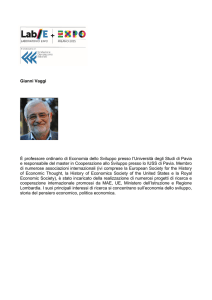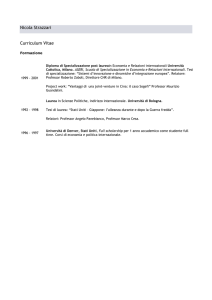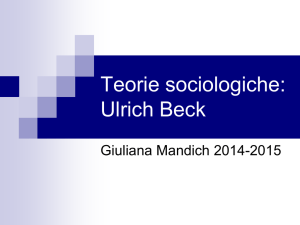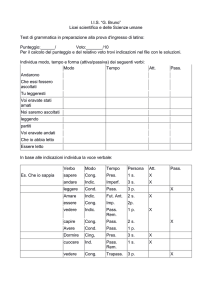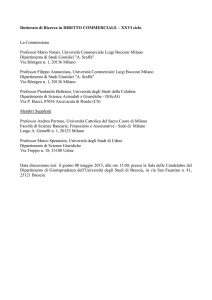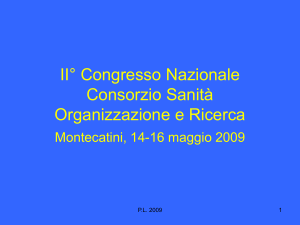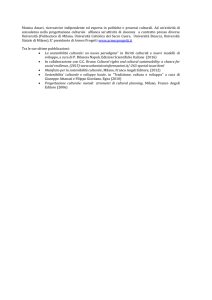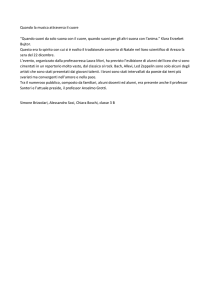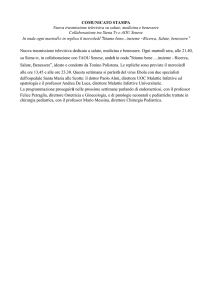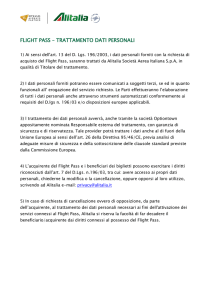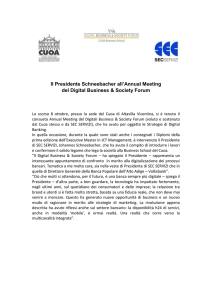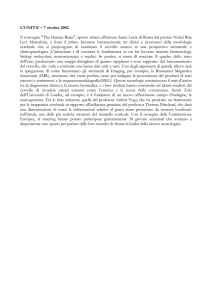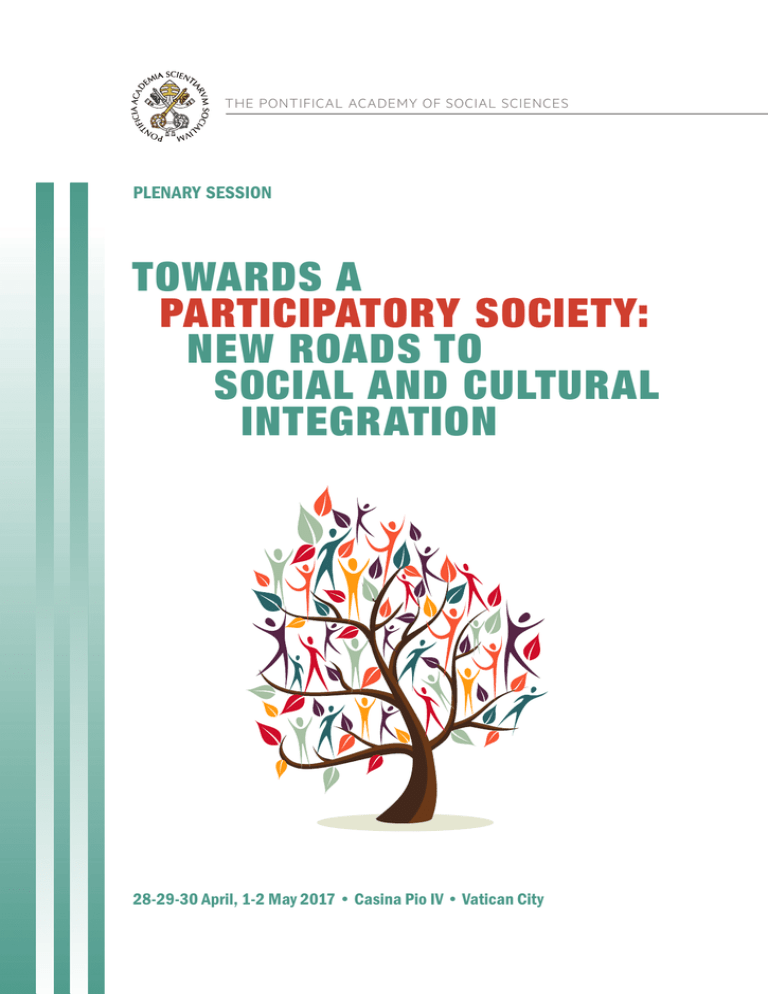
D
FIC
TI
THE PONTIFICAL ACADEMY OF SOCIAL SCIENCES
VM
LI
IA ACA
VM SOCIA
AR
IA SCIENT
I
EM
PO
N
PLENARY SESSION
TOWARDS A
PARTICIPATORY SOCIETY:
NEW ROADS TO
SOCIAL AND CULTURAL
INTEGRATION
28-29-30 April, 1-2 May 2017 • Casina Pio IV • Vatican City
“
The misuse and destruction of the environment are also accompanied by a relentless process of exclusion.
In effect, a selfish and boundless thirst for power and material prosperity leads both to the misuse of
available natural resources and to the exclusion of the weak and disadvantaged, either because they are
differently abled (handicapped), or because they lack adequate information and technical expertise, or
are incapable of decisive political action. Economic and social exclusion is a complete denial of human
fraternity and a grave offense against human rights and the environment. The poorest are those who suffer
most from such offenses, for three serious reasons: they are cast off by society, forced to live off what is
discarded and suffer unjustly from the abuse of the environment. They are part of today’s widespread and
quietly growing “culture of waste”.
Address of His Holiness Pope Francis to the General Assembly
of the UN, New York, 25 September 2015
”
PREFACE
ince the beginning of his Pontificate, Pope Francis has asked
our Academy to give more attention to the poor, the marginalized, the sick, the suffering, and to make a renewed commitment to fight all forms of social marginalization and exclusion.
This Plenary will respond to his call by seeking to deepen our understanding and explanation of the reasons for social exclusion
and, above all, to suggest practicable steps for promoting a thorough-going social and cultural integration, which we have termed
the ‘participatory society’. Unlike other meetings that are focused
on particular problems, this Plenary will address the topic from the
broadest vantage point, emphasizing new ways to promote the full
participation of people in society, meaning participation in all
spheres of civil and political society. The aim is not only to make
the current structure of societies more participatory, but also to
outline the characteristics of a participatory society capable of promoting the dignity of the human person in a context oriented to the
common good and based on the principles of subsidiarity and solidarity. one aspect has to do with dissatisfaction with existing ideas
for progressive social transformation that are incapable of avoiding
recurring processes of exclusion and marginalization of entire populations, generations and social groups on a world scale. The other
aspect is the need to develop a genuine concept of participation
in social life and highlight the best practices that can lead the society toward a good life for all in the different realms: in the economy, in the political institutions, in the cultural dynamics that are
now heavily influenced by the spread of information and communication technologies.
Through such research, we do not pretend to be elaborating a
new empirical model of participatory society. Instead, our aim is
rather to highlight the structural elements that would enable any
given social system to develop into a more participatory community. Such a development can only be initiated by a conversion of
minds. No external coercive power can create participation. As participation is an inherent quest deriving from the social nature of all
human beings, it can only grow from an appropriate anthropological background. lack of participation in economic, cultural, social
life is a consequence of according little consideration to human
dignity. Here, the Social Doctrine of the Church gives us a serious
impetus to rectify this deficiency, one that generally receives lesser
attention in current social and economic analysis. Participation is
a moral value and a principle in ordering human societies. It stems
from the internal quest for social change.
As Pope Francis reminds us: “A consumerist vision of human beings, encouraged by the mechanisms of today’s globalized economy,
has a levelling effect on cultures, diminishing the immense variety
which is the heritage of all humanity. Attempts to resolve all problems
through uniform regulations or technical interventions can lead to
overlooking the complexities of local problems which demand the
active participation of all members of the community.” (Laudato Si’,
#144). The participation of all interested parties entails being fully
informed about the projects of economic, social, cultural and political
initiatives and their different risks and possibilities. This includes not
just preliminary decisions but also various follow-up activities and
continued monitoring. Honesty and truth are needed in scientific and
political discussions. These should not be limited to the issue of
whether or not a particular project is currently permitted by law. As
Pope Francis warns, culture is more than what we have inherited from
the past; it is also, and above all, a living, dynamic and participatory
part of contemporary reality, which cannot be excluded as we rethink
the relationship between human beings and society. “In this universe,
shaped by open and intercommunicating systems, we can discern
countless forms of relationship and participation. This leads us to
think of the whole as open to God’s transcendence, within which it
develops. Faith allows us to interpret the meaning and the mysterious
beauty of what is unfolding. We are free to apply our intelligence towards things that are evolving positively, or towards those adding new
ills, new causes of suffering and real setbacks. This is what makes
for the excitement and drama of human history, in which freedom,
growth, salvation and love can blossom, or lead towards decadence
and mutual destruction” (Laudato Si’, #79). That is why it is urgent
to think of a participatory society as the way to foster a ‘good society’
beyond the failures of the political doctrine of multiculturalism that
has produced cultural relativism and social fragmentation.
The challenges to the realization of a participatory society derive from many factors. They have educational, economic, cultural,
and political roots. Those participating at the Plenary will first of all
analyze the overwhelmingly unfavorable factors of many kinds, e.g.
in the labour market, in the generational gap, in electoral systems,
in welfare services, in the realm of ICTs, and then provide evidence
of good practices that avoid them through the sharing economy,
new forms of welfare organizations for young people (Neets) and
the elderly, new policies for migrants, public-private partnerships,
personalized services for disabled people and disrupted families.
From the latter, new orientations will emerge for the introduction of
national and international legislation. Ultimately, the Plenary aims
to define the means by which production, consumption and allocation of social and cultural goods can systematically take place
in the interest of the common good and in ways that are both sustainable and efficient. These new ways of regulating and organizing
economic, cultural and political processes in terms of full social
participation will be ones that nurture social participation.
our reflections could develop according to the following rationale:
1. As a first step, our Plenary will elaborate on participation as
a quest flowing from a comprehensive consideration of the
human person interacting with others in society.
S
2. Further, we need to determine which structural economic, social and legal elements are obstacles to the free development
of participation in societies.
3. Participatory factors and processes in political and economic life
are already moving ahead in many contexts, generating good
practices at the macro, meso and micro levels which give hope
in the possibility of creating human-sized societies. These positive
initiatives must be identified. For instance, certain practices of
the sharing economy and Soziale Marktwirtschaft, bottom-up
processes for a better social and cultural integration of disabled
people, school dropouts, migrants, and new networks of Third
Sector organizations, deserve our attention.
4. Finally, we should be able to enunciate the principles that
should guide current social systems to become more participatory.
PIErPAolo DoNATI
+ rolAND MINNErATH
3
Verso una società partecipativa:
nuove strade per l’integrazione sociale e culturale
Sessione Plenaria | 28 aprile-2 maggio 2017
INTRODUZIONE
in dall’inizio del suo Pontificato, Papa Francesco ha chiesto all’Accademia di prestare particolare attenzione ai poveri, agli emarginati, ai malati, ai sofferenti e di rinnovare
l’impegno di combattere tutte le forme di emarginazione ed
esclusione sociale. Questa Plenaria risponderà alla sua richiesta
cercando di approfondire la nostra comprensione e le spiegazioni delle cause dell’esclusione sociale e, soprattutto, di suggerire iniziative praticabili per promuovere una profonda
integrazione sociale e culturale secondo quella che definiamo
“società partecipativa”.
A differenza di altri incontri focalizzati su problemi particolari, questa Plenaria affronterà il tema da un punto di vista più
ampio, sottolineando nuovi modi per promuovere la piena partecipazione delle persone nella società, intesa come partecipazione a tutte le sfere civili e politiche della società.
l’obiettivo non è solo quello di rendere più partecipativa l’attuale struttura della società, ma anche di delineare le caratteristiche di una società partecipativa capace di promuovere la
dignità umana in un ambiente orientato al bene comune e basato sui principi di sussidiarietà e solidarietà. Un aspetto in particolare riguarda l’insoddisfazione nei confronti delle iniziative
esistenti volte ad una trasformazione sociale progressiva, incapaci di evitare processi ricorrenti di esclusione ed emarginazione
di intere popolazioni, generazioni e gruppi sociali a livello mondiale. l’altro aspetto riguarda la necessità di sviluppare un concetto di partecipazione reale alla vita sociale e di individuare le
migliori pratiche mirate al benessere della società nei diversi
ambiti: economico, istituzioni politiche, dinamiche culturali che
adesso sono fortemente influenzati dalla diffusione delle tecnologie dell’informazione e della comunicazione.
Attraverso questa ricerca, non pretendiamo di elaborare un
nuovo modello empirico di società partecipativa. Al contrario, il
nostro scopo è piuttosto di individuare gli elementi strutturali
che possano permettere ad un sistema sociale di trasformarsi
in una comunità più partecipativa. Un tale sviluppo può avere
inizio solo con un cambio di mentalità. Nessun potere coercitivo
esterno può creare partecipazione. Essendo la partecipazione
un obiettivo connaturato che deriva dalla natura sociale di tutti
gli esseri umani, può solamente crescere sulla base di un appropriato background antropologico. la mancanza di partecipazione nell’ambito economico, culturale e sociale è una
conseguenza della scarsa considerazione della dignità umana.
In questo caso, la Dottrina Sociale della Chiesa ci fornisce un
forte impulso per correggere questa lacuna, che generalmente
non riceve abbastanza attenzione nell’attuale analisi sociale e
culturale. la partecipazione è un valore morale e un principio
che ordina le società umane e deriva da una ricerca interna volta
al cambiamento sociale.
Papa Francesco ci ricorda che “la visione consumistica
dell’essere umano, favorita dagli ingranaggi dell’attuale economia globalizzata, tende a rendere omogenee le culture e a inde-
bolire l’immensa varietà culturale, che è un tesoro dell’umanità.
Per tale ragione, pretendere di risolvere tutte le difficoltà mediante normative uniformi o con interventi tecnici, porta a trascurare la complessità delle problematiche locali, che
richiedono la partecipazione attiva degli abitanti” (Laudato si’,
#144). la partecipazione di tutte le parti interessate comporta
l’essere pienamente informati sui progetti di iniziative economiche, sociali, culturali e i rispettivi rischi e possibilità. Questo
comprende non solo le decisioni preliminari ma anche le varie
attività di follow-up e un continuo controllo. l’onestà e la verità
sono necessarie nei dibattiti scientifici e politici e non dovrebbero essere limitate al fatto che un determinato progetto sia o
non sia attualmente consentito dalla legge. Così come afferma
Papa Francesco, la cultura è più di quello che abbiamo ereditato
dal passato; è anche, e soprattutto, una parte vivente, dinamica
e partecipativa della realtà contemporanea che non può essere
esclusa se vogliamo riconfigurare il rapporto tra esseri umani e
società.
“In questo universo, composto da sistemi aperti che entrano
in comunicazione gli uni con gli altri, possiamo scoprire innumerevoli forme di relazione e partecipazione. Questo ci porta
anche a pensare l’insieme come aperto alla trascendenza di
Dio, all’interno della quale si sviluppa. la fede ci permette di interpretare il significato e la bellezza misteriosa di ciò che accade. la libertà umana può offrire il suo intelligente contributo
verso un’evoluzione positiva, ma può anche aggiungere nuovi
mali, nuove cause di sofferenza e momenti di vero arretramento.
Questo dà luogo all’appassionante e drammatica storia umana,
capace di trasformarsi in un fiorire di liberazione, crescita, salvezza e amore, oppure in un percorso di decadenza e di distruzione reciproca. Pertanto, l’azione della Chiesa non solo cerca
di ricordare il dovere di prendersi cura della natura, ma al tempo
stesso «deve proteggere soprattutto l’uomo contro la distruzione
di sé stesso»” (Laudato si’ #79). Per questo diventa urgente pensare alla società partecipativa come metodo di favorire una
“buona società” al di là dei fallimenti della dottrina politica del
multiculturalismo che ha prodotto la cultura del relativismo e
frammentazione sociale.
le sfide alla realizzazione di una società partecipativa derivano da vari fattori e hanno radici educative, economiche, culturali e politiche. I partecipanti alla Plenaria dovranno
innanzitutto esaminare i fattori di vario tipo che sono pesantemente sfavorevoli per esempio nel mercato del lavoro, nel gap
generazionale, nei sistemi elettorali, nei servizi sociali, nel
campo delle ICT (tecnologie dell’informazione e della comunicazione) per poi dimostrare quali sono le buone pratiche che li
superano grazie all’economia della condivisione, a nuove forme
di organizzazione sociale per i giovani (Neets) e gli anziani, a politiche innovative per i migranti, al partenariato pubblico-privato,
ai servizi personalizzati per persone disabili e per le famiglie disagiate, derivandone nuovi orientamenti per le normative na-
F
4
Towards a Participatory Society: New Roads to Social and Cultural Integration
3. I fattori della partecipazione e i processi nell’ambito politico
ed economico stanno già facendo progressi in molti contesti,
producendo, a livello macro, meso e micro, buone pratiche
che alimentano la speranza di poter creare società a misura
d’uomo. Sono queste le iniziative che devono essere individuate. Per esempio, meritano la nostra attenzione alcune pratiche dell’economia della condivisione e dell’economia
sociale di mercato, per esempio processi bottom-up per una
migliore integrazione sociale e culturale delle persone disabili, di coloro che hanno abbandonato gli studi, dei migranti
e nuovi network di organizzazioni del terzo settore.
zionali e internazionali. In sostanza, l’obiettivo della Plenaria è
quello di definire gli strumenti grazie ai quali la produzione, il
consumo e l’allocazione di beni sociali e culturali possono essere instaurati sistematicamente nell’interesse del bene comune e in maniera sostenibile ed efficiente. Di fatto, questi
nuovi modi di orientare e organizzare i processi economici, culturali e politici in termini di piena partecipazione, sono gli unici
che favoriranno la partecipazione sociale.
le nostre riflessioni potrebbero svilupparsi secondo la seguente logica:
4. Infine, dovremmo essere capaci di enunciare dei principi
guida per i sistemi sociali attuali in modo che possano diventare più partecipativi.
1. Come primo passo, la Plenaria esaminerà la partecipazione
come obiettivo basato su di una considerazione globale della
persona umana che interagisce con gli altri all’interno della
società.
2. occorrerà inoltre determinare quali elementi strutturali economici, sociali e giuridici ostacolino il libero sviluppo di società partecipative.
PIErPAolo DoNATI
+ rolAND MINNErATH
5
PROGRAMME
FRIDAY 28 APRIL
Opening session
CURRENT DYNAMICS THAT CHALLENGE A FULL PARTICIPATION OF PEOPLE TO SOCIETY
Chair: Margaret S. Archer
9:00
Word of Welcome
PASS President Margaret S. Archer / H.E. Msgr. Marcelo Sánchez Sorondo / H.E. Msgr. Paul Richard Gallagher
9:15
Introduction to the Plenary
Pierpaolo Donati
9:30
The Magisterium on Human Dignity and the rights to Full Participation in Society
H.E. Msgr. Roland Minnerath
10:00 Discussion
10:30 Is Inequality – of any kind – an obstacle for Social Integration and Participation? Towards an Integral Ecology
José T. Raga
11:00 Discussion
11:30 Coffee Break
12:00 The Dynamics of Social Inequalities in the Present World
Joseph Stiglitz
12:30 Discussion
13:00 Commemoration of Kenneth Arrow (Partha Dasgupta) and Hans Tietmeyer (José T. Raga)
13:45 lunch at the Casina Pio IV
Chair: Vittorio Possenti
15:15 The Etiology of Social Exclusion: Its Global Distribution and Differences
Paulus Zulu
15:45 Discussion
16:15 The Etiology of Economic Exclusion: Its Global Distribution and Differences
Juan J. Llach
16:45 Discussion
17:15
Coffee Break
17:45 Cultural Exclusion and Civil Society
Ana Marta González
18:15 Discussion
19:30 Dinner at the Casina Pio IV
6
Towards a Participatory Society: New Roads to Social and Cultural Integration
SATURDAY 29 APRIL
HUMAN RIGHTS & PARTICIPATION IN THE SPHERES OF SOCIETY
Chair: lubomír Mlčoch
9:00
Successes and Failures of Democratic Systems in Combatting Social and Cultural Exclusion
Douglas Porpora
9:30
Discussion
10:00 The role of the International Human rights System in Addressing the Challenge of Social Exclusion
Paolo Carozza
10:30 Discussion
11:00 Coffee Break
11:15 Social Inclusion Beyond Exchanges and Distributions
Russell Hittinger
11:45 Discussion
12:15 The rights of refugees from the Point of View of Morals, Natural law, and Politics
Vittorio Hösle
12:45 Discussion
13:15 lunch at the Casina Pio IV
Chair: Allen D. Hertzke
15:30 The Social & Cultural Integration of Migrants
Gérard-François Dumont
16:00 Discussion
16:15 Inclusive Citizenship Amid religious and Cultural Diversity
Gregory M. Reichberg
16:45 Discussion
17:00 Coffee Break
17:30 Participatory Democracy and the Under-represented
Rocco Buttiglione
18:00 Discussion
Chair: Stefano Zamagni
18:15 Slavery, Participation and Human rights
H.E. Msgr. Marcelo Sánchez Sorondo
18:45 Discussion
19:30 Dinner at the Casina Pio IV
SUNDAY 30 APRIL
PILGRIMAGE TO THE APOSTOLIC PALACE OF CASTEL GANDOLFO
9:00
Departure from the Domus Sanctae Marthae
9:15
Departure from the hotel Crowne Plaza
19:30 Dinner at the Casina Pio IV
7
Towards a Participatory Society: New Roads to Social and Cultural Integration
MONDAY 1 MAY
GOOD POLICIES & PRACTICES FEEDING A PARTICIPATORY SOCIETY
Chair: Gérard-François Dumont
9:00
Marktwirtschaft and Sharing Economy in the Perspective of a Participatory Society
Jörg Guido Hülsmann
9:30
Discussion
10:00 Towards an open Social Economy
Yochai Benkler
10:30 Discussion
11:00 Coffee Break
11:30 Good Practices in Dealing with the NEET: Policy responses
Massimiliano Mascherini
12:00 Discussion
12:30 Participation and Collegiality: lessons From Network Studies of Peer Production
Emmanuel Lazega
13:00 Discussion
13:30 lunch at the Casina Pio IV
Chair: José T. raga
15:00 religious Agency and the Integration of Marginalized People
Allen D. Hertzke
15:30 Discussion
16:00 Communication, Participation and Socio-Cultural Integration
Paul S.-N. Lee
16:30 Discussion
17:00 Coffee Break
17:30 The Social and Cultural Integration of Disabled People
Fabio Ferrucci
18:00 Discussion
18:30 Migration and Integration: Österreichs Antworten
Herbert Schambeck
19:00 General Discussion
19:30 Dinner at the Casina Pio IV
8
Towards a Participatory Society: New Roads to Social and Cultural Integration
TUESDAY 2 MAY
NEW GUIDELINES FOR ACHIEVING SOCIAL & CULTURAL PARTICIPATION
Chair: Vittorio Hösle
9:00
Word of Welcome
H.E. Card. Pietro Parolin
9:15
Can Increased Participation be Introduced From the Bottom-Up?
Margaret S. Archer
9:45
Discussion
10:15 In Which Way Can Interculturality Achieve Social Integration?
Pierpaolo Donati
10:45 Discussion
11:15 Coffee Break
11:45 The Contribution of the Civil Economy Paradigm to Enhance Social and Economic Participation
Stefano Zamagni
12:15 Discussion
12:45 The Social rehabilitation and reintegration of Child Soldiers
H.R.H. The Princess of Hanover
13:00 General Discussion
13:30 lunch at the Casina Pio IV
Chair: Paolo Carozza
15:30 National legislations Addressing Social & Cultural Integration
John McEldowney
16:00 Discussion
16:30 Political Participation in Europe: What is required?
Janne Matlary
17:00 Discussion
17:30 Coffee Break
Chair: Margaret S. Archer
18:00 Towards Formulating PASS recommendations
18:30 Closed Session for Academicians
20:00 Dinner at the Casina Pio IV
9
27 April 2017 | v. 34
LIST OF PARTICIPANTS
Margaret S. ARCHER
President of the Pontifical Academy
of Social Sciences; Director, Centre for
Social ontology, Department of
Sociology, University of Warwick, UK
Ana Marta GONZÁLEZ
PASS Academician;
Associate Professor of Moral Philosophy,
University of Navarra, Spain
Yochai BENKLER
Berkman Professor of Entrepreneurial
legal Studies at Harvard law School;
Faculty Co-Director of the Berkman Klein Center
for Internet and Society at Harvard University, USA
Allen D. HERTZKE
PASS Academician;
Presidential Professor of Political Science
University of oklahoma, oK, USA
Rocco BUTTIGLIONE
PASS Academician;
Presidente del Consiglio Nazionale UDC
Palazzo Montecitorio
rome, Italy
Russell HITTINGER
PASS Academician;
University of Tulsa
Department of Philosophy and religion
Tulsa, oK, USA
H.R.H. The Princess of Hanover
Association mondiale des amis de l’enfance – AMADE
Monaco, Monte Carlo
Vittorio HÖSLE
PASS Academician;
Paul Kimball Professor of Arts and letters,
University of Notre Dame, USA
Paolo CAROZZA
PASS Academician; Professor of law, Concurrent
Professor of Political Science, Director, Helen Kellogg
Institute for International Studies,
University of Notre Dame, IN, USA
Jörg Guido HÜLSMANN
Professor of Economics at the
University of Angers, France
Partha DASGUPTA
PASS Academician; Frank ramsey Professor of
Economics, University of Cambridge, and Professor
of Environmental and Development Economics,
University of Manchester, UK
Emmanuel LAZEGA
Professor of Sociology,
Institut d'Etudes Politiques de Paris, France
Pierpaolo DONATI
PASS Academician; Professore di Sociologia,
Dipartimento di Sociologia,
Università di Bologna
Bologna, Italy
Paul Siu-Nam LEE
Professor in the School of Journalism and
Communication at the Chinese University of Hong
Kong; Director of the Hong Kong Institute of AsiaPacific Studies, and Dean of Social Science
Gérard-François DUMONT
PASS Academician;
Université de Paris-Sorbonne
Paris, France
Juan José LLACH
PASS Academician; Director, GESE (Centro de
Estudios de Gobierno, Empresa, Sociedad y
Economía) IAE-Universidad Sustral
Buenos Aires, Argentina
Fabio FERRUCCI
Professore di Sociologia
Dipartimento di Scienze Umanistiche Sociali
e della Formazione
Università del Molise, Italy
Massimiliano MASCHERINI
European Foundation for the Improvement
of living and Working Conditions (EUroFoUND)
Dublin, Ireland
10
Towards a Participatory Society: New Roads to Social and Cultural Integration
Janne MATLARY
PASS Academician;
Porfessor of Political Science, University of oslo
Department of Political Science
oslo, Norway
Gregory M. REICHBERG
PASS Academician; research Professor, the Peace
research Institute oslo and the University of oslo,
Department of Political Science, Norway
John McELDOWNEY
Professor of law and Director of Warwick’s
School’s new llM in EU law in the World
Economy, Warwick University
Warwick, UK
Louis SABOURIN
PASS Academician;
Université du Québec
École Nationale d’Administration Publique
Montréal, Québec, Canada
H.E. Msgr. Roland MINNERATH
PASS Academician;
Archevêché
Dijon, France
H.E. Msgr. Marcelo SÁNCHEZ SORONDO
Chancellor, The Pontifical Academy of
Social Sciences, Vatican City
Lubomír MLČOCH
PASS Academician; Charles University
Institute of Economic Studies
Faculty of Social Sciences
Prague, Czech republic
Herbert SCHAMBECK
PASS Academician;
Institute for Constitutional law and Political Sciences
University of linz
Austria
Douglas PORPORA
Professor of Sociology in the Department of
Culture and Communication
Drexel University
Philadelphia, USA
Joseph STIGLITZ
PASS Academician; Professor of Economics,
Columbia University
Graduate School of Business
New York, NY, USA
Vittorio POSSENTI
PASS Academician;
Università Ca’ Foscari di Venezia
Dipartimento di Filosofia e Teoria delle Scienze
Venice, Italy
Stefano ZAMAGNI
PASS Academician; Professore di Economia,
Università di Bologna
Dipartimento di Scienze Economiche
Bologna, Italy
José T. RAGA
PASS Academician;
Economics, Complutense University of Madrid,
Spain
Paulus ZULU
PASS Academician;
University of Kwazulu Natal
Director, Maurice Webb race relations unit
Durban, Natal (South Africa)
11
BIOGRAPHIES
Yochai Benkler is the Berkman Professor of Entrepreneurial legal Studies at Harvard law School, and faculty co-director of the Berkman Klein
Center for Internet and Society at Harvard University. Since the 1990s
he has played a role in characterizing the role of information commons
and decentralized collaboration to innovation, information production,
and freedom in the networked economy and society. His books include
The Wealth of Networks: How social production transforms markets
and freedom (Yale University Press 2006), which won academic awards
from the American Political Science Association, the American Sociological Association, and the McGannon award for social and ethical relevance in communications. In 2012 he received a lifetime achievement
award from oxford University in recognition of his contribution to the
study and public understanding of the Internet and information goods.
His work is socially engaged, winning him the Ford Foundation Visionaries Award in 2011, the Electronic Frontier Foundation’s Pioneer Award
for 2007, and the Public Knowledge IP3 Award in 2006. It is also anchored in the realities of markets, cited as “perhaps the best work yet
about the fast moving, enthusiast-driven Internet” by the Financial
Times and named best business book about the future in 2006 by
Strategy and Business. Benkler has advised governments and international organizations on innovation policy and telecommunications, and
serves on the boards or advisory boards of several nonprofits engaged
in working towards an open society. His work can be freely accessed
at http://www.benkler.org.
Jörg Guido Hülsmann (born May 18, 1966) is a Professor of Economics
at the University of Angers in France and adherent of the Austrian
School. He has edited six books and is the author of The Ethics of
Money Production and Mises: The Last Knight of Liberalism. He has
translated several renowned economics books into German and written
many articles in English, French, and German. He is a contributor to
scholarly journals such as the Quarterly Journal of Austrian Economics,
The Independent review, Procesos de Mercado, and the Journal of Markets and Morality, as well as to magazines and newspapers such as la
Tribune (France), Finanz und Wirtschaft (Switzerland), le Temps
(Switzerland), Wiener Zeitung (Austria), and eigentümlich frei (Germany). Professor Hülsmann is the Director of the Austrian research
Seminar in Paris.
Emmanuel Lazega is Professor of Sociology at the Institut d’Etudes
Politiques de Paris (Sciences Po) and a member of the Centre de Sociologie des organisations. His current research focuses on social,
intra- and inter-organizational networks in the economy, with a substantive focus on the social control of business. Publications include
Multilevel Network Analysis for the Social Sciences (edited with Tom
A.B. Snijders, 2015); Conventions and Structures in Economic Organization: Markets, Networks, and Hierarchies (Edward Elgar, 2002,
edited with olivier Favereau); The Collegial Phenomenon: The Social
Mechanisms of Cooperation Among Peers in a Corporate Law Partnership (oxford University Press, 2001); Micropolitics of Knowledge:
Communication and Indirect Control in Workgroups (Aldine-de
Gruyter, 1992).
Paul Siu-Nam Lee is currently Professor in the School of Journalism
and Communication at CUHK, and has served concurrently as the
Dean of Social Science since August 2005. He received his first and
master’s degrees from CUHK and his PhD degree from the University
of Michigan. He joined CUHK in 1986 and has contributed to the development and management of the University in a multitude of ca-
pacities, e.g. as Director of the School of Journalism and Communication,
Director of the Hong Kong Institute of Asia-Pacific Studies, and Dean
of Social Science, while energetically keeping up the momentum of
his scholarly pursuits. An expert in international/intercultural communication, telecommunications policy, development communication
and media criticism, Prof. lee engages in timely and valuable research
of topical interest, and actively participates in international conferences.
He also collaborated with overseas and mainland scholars to conduct
research projects, including a cross-cultural study on the flow of
foreign media culture and people’s responses to it, and the first comparative study of Internet communication in Chinese societies. A
pioneer in the study of China and Hong Kong telecommunications,
he is the first academic to be appointed as a member of the Hong
Kong Broadcasting Authority in 1990-92 by the Hong Kong Government.
In 1999, he was nominated as an Associate Fellow by the international
communication network of the UNESCo, orbicom. Prof. lee has published widely at major cities all over the world and has authored and
edited 14 books and numerous book chapters. He is also the founding
chief editor of the Chinese Journal of Communication (routledge).
Massimiliano Mascherini is Italian and joined Eurofound as research manager at the end of 2009. He is responsible for Eurofound
projects on youth and NEETs. He studied at the University of Florence
where he majored in Actuarial and Statistical Sciences and then obtained a PhD in Applied Statistics. He has been Visiting Fellow at the
University of Sydney and at Aalborg University. Before joining Eurofound he worked as scientific officer at the Joint research Centre of
the European Commission and his main research topics refer to flexicurity, social cohesion and methodological advances in composite
indicators. over the past few years he has produced in these fields a
steady flow of publications in international peer-reviewed journals,
conference proceedings and policy reports.
John McEldowney is Professor of law at the University of Warwick. He
is Deputy Chair of the Study of Parliament Group. He delivered the 10th
Hugh Fitzpatrick lecture on “Biography and Bibliography” at Kings Inns
Dublin Ireland in 2004. In 2001 he was elected the New Zealand law
Foundation Distinguished Visiting Fellow. He has held visiting appointments in universities in Japan and France. In 2000 he was the World
Bank Visiting Fellow in the Supreme Court in Venezuelea. In 2004 he
was awarded a medal of honour from the University of lille. He has
acted as external examiner for a number of universities, including the
open University. Professor McEldowney has given evidence to a number
of inquiries held by the House of lords Select Committee on the Constitution specifically on the Draft European Constitution in 2002-3, Parliament and the legislative Process in 2003/4 and on the use of the
prerogative of war. He is currently working on a new book on Environmental law for Edward Elgar.
Douglas Porpora is Professor of Sociology at Drexel University in
Philadelphia (Pennsylvania) in the Department of Anthropology, specialized in Political Economy, Culture, Social Theory, and Philosophy
of Social Science. Writing widely on social theory and on matters of
collective morality, his other books include Post-Ethical Society: The
Iraq War, Abu Ghraib, the the Moral Failure of the Secular (Chicago:
2013); Landscapes of the Soul: The Loss of Moral Meaning in American Life (oxford: 2001); The Concept of Social Structure (Greenwood
1987), and How Holocausts Happen: The United States in Central
America (Temple: 1992).
For the biographies of PASS Academicians, please see www.pass.va
12
Towards a Participatory Society: New Roads to Social and Cultural Integration
Memorandum
1. Every day a bus will leave the Crowne Plaza Hotel at 7.30 a.m. to accompany participants to the Church Santo Stefano
degli Abissini, where a concelebrated Holy Mass will be held at 8.00 a.m. After the Holy Mass, a bus will leave the
Domus Sanctae Marthae at 8:45 a.m. for the Academy. A bus will depart from the Academy after dinner to take participants back to the hotels (Domus Sanctae Marthae and Crowne Plaza Hotel). lunch and dinner for the participants
will be served at the Academy every day.
2. Program of Sunday 30 April is as follows:
• 9:00 a.m. bus available from the Domus Sanctae Marthae to Castel Gandolfo;
• 9:15 a.m. bus available from the Crowne Plaza Hotel to Castel Gandolfo;
• 10:00 a.m. concelebrated Holy Mass at the Apostolic Palace of Castel Gandolfo;
• 11:00 a.m. guided visit to the Apostolic Palace, Barberini Gardens and Antiquarium of the Pontifical Villas;
• 13:30 lunch at ristorante Bucci;
• 15:30 bus available to the Crowne Plaza Hotel and the Domus Sanctae Marthae;
• 19:00 bus available from the Crowne Plaza Hotel to the Casina Pio IV (for the dinner);
• 19:15 bus available from the Domus Sanctae Marthae to the Casina Pio IV (for the dinner);
At the end of the dinner a bus will depart from the Academy to take participants back to the hotels.
3. If you are a vegetarian, please let us know as soon as possible.
4. WIFI is available in the conference hall at the Casina Pio IV. Please log in to the network called WlAN_PADS (WPA2)
as the username and use !!WIFI_2017_PADS!! as the password. You can check our website www.pass.va for further
information on the Academy, the Academicians, and current and past events.
Holy Masses
Friday 28 April 2017
h. 8:00 a.m.
Church Santo Stefano
degli Abissini
H.E. Msgr.
Paul R. Gallagher
Saturday 29 April 2017
h. 8:00 a.m.
Church Santo Stefano
degli Abissini
H.Em. Card.
Peter K.A. Turkson
Monday 1 May 2017
h. 8:00 a.m.
Church Santo Stefano
degli Abissini
H.Em. Card.
Giovanni Battista Re
13
Tuesday 2 May 2017
h. 8:00 a.m.
Church Santo Stefano
degli Abissini
H.Em. Card.
Gerhard Ludwig Müller
Sede della Pontificia
Accademia delle Scienze Sociali
Seat of the Pontifical Academy of Social Sciences
(CASINA PIO IV)
Chiesa di Santo Stefano degli Abissini
St Stephen of the Abyssinians Church
Ingresso del Perugino
The ‘Perugino’ gate
Ingresso Musei Vaticani
Entrance gate to the Vatican Museum
Domus Sanctae Marthae
Altare Tomba S. Pietro
Altar of St Peter’s Tomb
Ingresso Sant’Uffizio
The ‘Sant’Uffizio’ gate
Ingresso Sant’Anna
The ‘Sant’Anna’ gate
THE PoNTIFICAl ACADEMY oF SoCIAl SCIENCES • CASINA PIo IV • V-00120 VATICAN CITY
Tel: +39 0669881441 • Fax: +39 0669885218 • Email: [email protected]
For further information please visit: www.pass.va • www.endslavery.va
/nonservos
@nonservos • @CasinaPioIV
/nonservos

